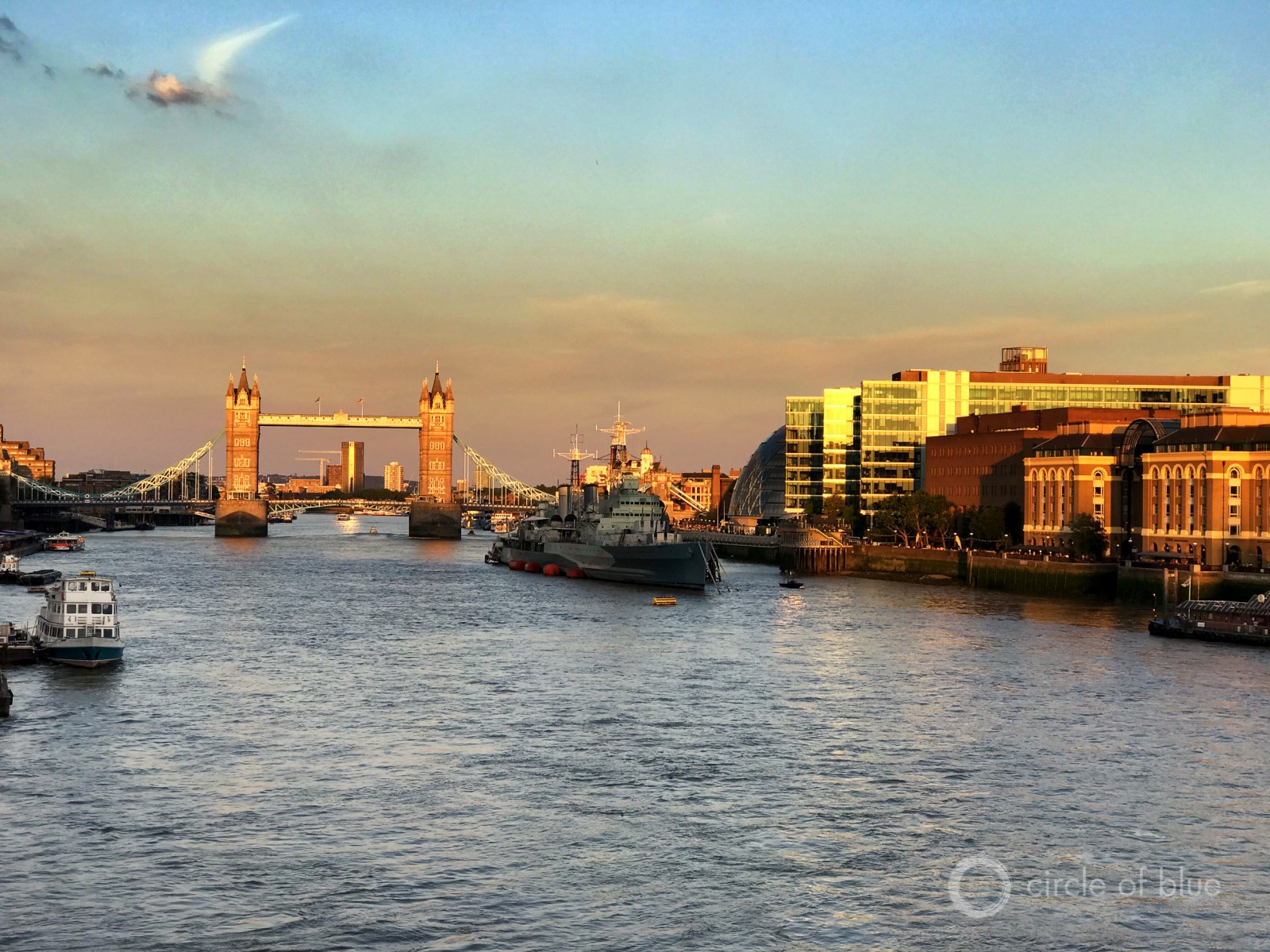The Stream, December 7, 2022: England’s Water Industry Mostly Owned by Private Foreign Interests, Report Reveals

Tower Bridge, London. Photo © J. Carl Ganter / Circle of Blue
YOUR GLOBAL RUNDOWN
- The vast majority of England’s water industry is owned by foreign firms and businesses, a Guardian investigation reveals.
- Zambia begins rationing electricity as paltry water levels shut down hydropower production at a major dam.
- A hole in a sewer pipe that dropped wastewater into Lake Ontario for an estimated 26 years was discovered and sealed.
- The UN’s annual summit on biodiversity begins today in Montreal, with goals that include plans to restore and protect global freshwater ecosystems.
Washington state banned net pen aquaculture in state-owned waters, a decision that will protect native fish species.
“It’s clear this victory for wild salmon, orcas, and Puget Sound belongs to no one person or group. Without the separate actions of thousands of individuals, Washington’s Tribal Nations, businesses, organizations, chefs, fishing groups, scientists, elected officials, and so many others working together over the last five years, this would never have been possible.” — Emma Helverson, Executive Director of Wild Fish Conservancy.
Advocates say that the decision has both short- and long-term benefits. In the short-term, pollution from commercial pens will cease; recovering native fish species will be less exposed to diseases that mass-farmed fish may carry; and net collapses — such as one particularly devastating event in 2017, when 260,000 farmed, non-native salmon were released into the Puget Sound — will no longer pose a risk. After the net pens are removed, 130 acres of Puget Sound will be natural again.
Long-term, these former farming locations — which had degraded over decades of use — will be sites of passive restoration as native, endangered, and sacred fish species also recover their numbers.
— Christian Thorsberg, Interim Stream Editor
Recent WaterNews from Circle of Blue
- Opposition to CAFOs Mounts Across the Nation — Manure discharges from livestock is a major source of water pollution.
- Federal Water Tap, December 5 — For Tribes, White House Promises Climate Relocation Funding, Water Pollution Standards
The Lead
According to research from the Guardian, 72 percent of England’s water sector is owned by foreign shareholders. The investigation found that over 100 international entities — including investment and private equity firms, private businesses, and pension funds — control the majority of England’s 15 big water and sewage companies. Several names cited include the Qatar Investment Authority, BlackRock, and the Abu Dhabi Investment Authority.
Overall, 17 foreign countries have a stake in England’s water companies, with the U.S. holding the largest share at 17 percent. The findings coincide with mounting calls for England’s water industry — of which the U.K. owns 10 percent — to update aging infrastructure that places the environment and human health at risk. Still, the entire picture remains incomplete — ownership of only 82 percent of England’s water industry was traced in the investigation.
This Week’s Top Water Stories, Told In Numbers
4.1 Percent
Water levels, compared to full capacity, in Kariba Dam, which sits on the border of Zambia and Zimbabwe. Hydropower generated by the dam is the primary source of electricity for both countries. But supplying power has become impossible — due to reduced river inflows the dam’s reservoir continues to drop, and is too low to produce energy. Beginning December 15, customers in Zambia will be forced to ration their electric supply, Reuters reports.
337 million
Liters of wastewater and sewage estimated to have emptied into Lake Ontario’s Hamilton Harbour over the course of 26 years. Officials recently found and sealed a hole in a combined sewer pipe that was estimated to have occurred in 1996. The repair cost $30,000, Water Canada reports.
On the Radar
Beginning today, representatives from 196 countries gathering at an annual summit will attempt to solidify plans to protect biodiversity and ecosystem restoration around the globe. Ahead of the meetings, 22 achievable outcomes — still in draft form — were published by the United Nations. “[The draft] includes ambitious, but achievable, targets to halt and reverse biodiversity loss, reinforce climate action, build sustainable cities and food systems, strengthen public planning, and redirect financial flow to support it all,” said Elizabeth Maruma Mrema, executive secretary of the Convention on Biological Diversity, in an October statement. Mrema went on to highlight the need for cities to support sustainable rainwater drainage systems, and river renewal programs. The convention will last 12 days.
More Water News
Flint’s Cruiser: Dragonfly species, presumed extinct for decades, spotted near riverbed in Sri Lanka.
Enviva Whistleblower: Mongabay reports that Enviva, the world’s largest producer of wood pellets, has contributed to significant deforestation in the U.S. despite touting eco-friendly practices.
Christian Thorsberg is an environmental writer from Chicago. He is passionate about climate and cultural phenomena that often appear slow or invisible, and he examines these themes in his journalism, poetry, and fiction.







Leave a Reply
Want to join the discussion?Feel free to contribute!